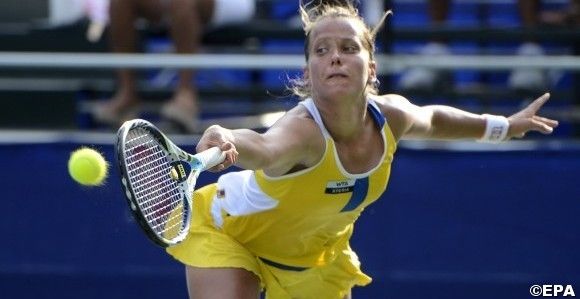Barbora Zahlavova Strycova Given Six-Month Ban For Doping Violation
 Barbora Zahlavova Strycova Given Six-Month Ban For Doping Violation
Barbora Zahlavova Strycova Given Six-Month Ban For Doping Violationepa03328316 Barbora Zahlavova-Strycova of Czech Republic returns the ball during her match with Edina Gallovits-Hall of Romania at the Citi Open tennis tournament in Washington, DC, USA, 30 July 2012. Gallovits-Hallhall defeated Zahlavova-Strycova. EPA/SHAWN THEW |
As calls for increased levels of drug testing have become prevalent in top-flight tennis and the Czech Republic’s Barbora Zahlavova Strycova has been given a back-dated six-month ban after testing positive for a banned stimulant, the sport’s four ruling bodies have agreed to meet in New York next month to address the issue.
Top of the agenda for the Grand Slam committee, the ATP World Tour, the WTA and the International Tennis Federation will be the need to make sufficient financial measures to facilitate the introduction of biological passports and so significantly upgrade and modernize tennis’ anti-doping program .
The big four of men’s tennis; Novak Djokovic, Roger Federer, Rafael Nadal and Andy Murray, all yearn for biological passports to avert suspicions that doping might be as prevalent in tennis as cycling. They all insist there is nowhere near sufficient blood testing in the sport and Federer said: “A blood passport will be necessary as some substances can’t be discovered right now but might in the future, and that risk of discovery can chase cheaters away.”
Meanwhile 26-year-old Zahlavova Strycova, formerly world no. 39 and currently ranked 124th, has been banned following the submission of a positive urine sample in Luxembourg last October.
She claimed the stimulant, sibutramine, had entered her system via weight-loss supplement ACAI Berry Thin and denied any intent to enhance her performance.
With the exception of an ITF $75,000 tournament in Germany the following week, Zahlavova Strycova has not competed since and with her ban backdated, she can return to competition on April 16.
The ITF said it did not dispute Zahlavova Strycova’s account of the circumstances surrounding her ingestion of sibutramine.
©Daily tennis News Wire
Topics: anti doping in tennis, ATP anti doping rules, Barbora Zahlavova Strycova, Czech tennis news, Sports, Tennis News, tennis sports, WTA doping rules


10sBalls Top Stories
- Reasons Behind the Increase in Sex Shops
- Reasons Behind the Increase in Sex Shops
- Reasons Behind the Increase in Sex Shops
- Casibom: Yaşayan Casinolar ve Bahisler Lider Platform
- Sea Star Casino: Play Games Without Registering Online
- JETZT DEN SWEET BONANZA SLOT GRATIS DREHEN
- Азартные игры с Мостбет Казино – испытайте удачу
- Çevrimiçi en iyi yuvalar: Hizmetinizde Karavan Bet Casino
- Top No Deposit Free Spins Offer for Canadians – December 2024
- Abe Bet Casino: Ücretsiz dönüşlerle heyecan hissedin
- Ünlü slotlar çevrimiçi kumarhanelerde başarı bet giriş ücretli formatta
- BasariBet Casino Giriş – En Güzel Canlı Casino Oyunlarına Katılın
- Игра на деньги в казино 1вин казино: безопасность
- De parking de credits sans oublier les Diction Casino Archive sauf que Perception
- Играть в хитовые слоты в надежных клубах azino777




